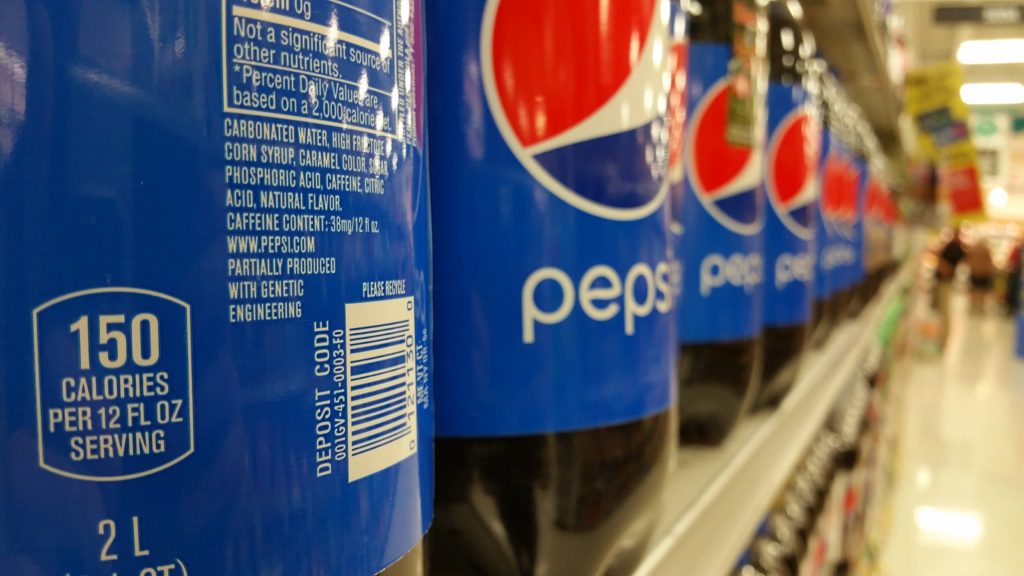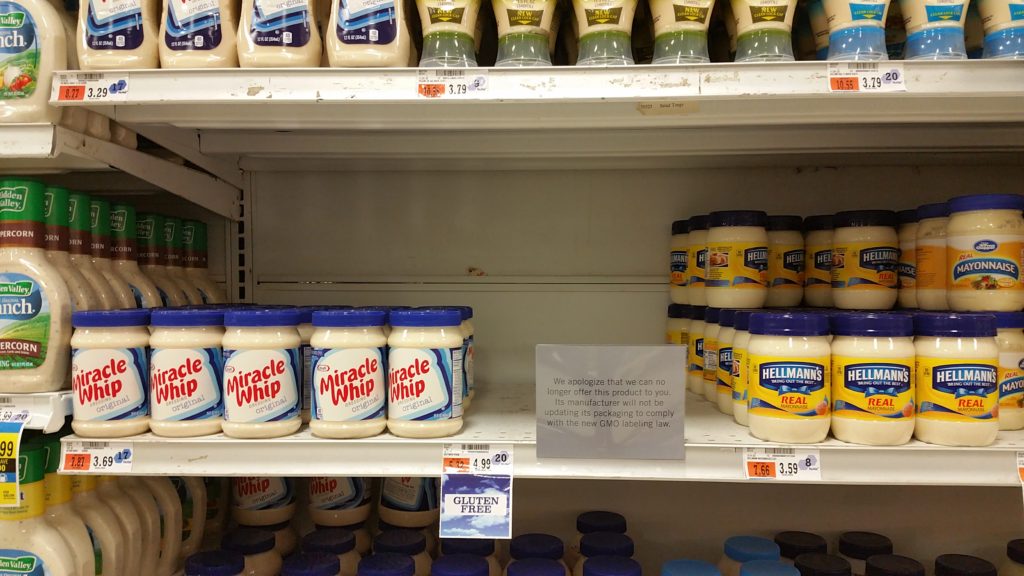Vermont’s experiment with GMO labeling was brief, but memorable. In July, the single month that House Act 120 was in effect, consumers saw new signs popping up at grocery stores — just not the type many were envisioning.
“We apologize that we can no longer offer this product to you,” reads one such sign at the Price Chopper in Brattleboro. “Its manufacturer will not be updating its packaging to comply with the new GMO labeling law.”
The hope, says store manager Kenneth Lefebvre, is that customers will be prompted by the notice to contact the makers of their favorite products and lobby for compliance. The worry for many in the industry has been that the law will result in national manufacturers abandoning the relatively small Vermont market instead of pouring resources into investigating whether or not genetically modifed organisms (GMOs) are a part of their supply chain.
Meanwhile, some companies have read the writing on the wall and opted to label their products nationwide even before Vermont’s law took effect.
“If it was widespread that everybody wasn’t compliant and no one was going to be, it would be a different story,” Lefebvre says. “Our fear was Coke, and Pepsi, and Frito-Lay, but they’ve decided that they’re doing it themselves now, so it’s coming in that way for us.”
But the law was short-lived. On July 29, President Obama signed S.764, known as the National Bioengineered Food Disclosure Standard, federal legislation that will require food producers to inform people if their product contains GMOs. The federal bill trumps Vermont’s and is slated to take effect in two years. The Vermont attorney general’s office announced shortly after the signing that it did not intend to enforce the state law in the interim, so just as quickly as the signs popped up, they’re likely to be taken down, letting hold-out manufacturers return their products to the Green Mountain State’s shelves.
“The intent of the federal law was certainly to short-circuit any existing state law at the moment that President Obama signed it on Friday afternoon,” says Todd Daloz, Vermont assistant attorney general. “There was no sort of grace period that the state laws would stay in effect while the regulations were written.”
Daloz says the reason for the decision not to enforce the law stems from the likelihood that the federal law would likely be in place before the state cases could be litigated.
“I think it’s unlikely that we’ll see federally required labels within two years.” Daloz says. “The regulations might be done by then, and they might even be enacted, but there’s still going to be a compliance period.”
On the surface, the federal bill seems like a win for anti-GMO activists, but many have derided the bill as a sham. By its staunchest opponents, it’s been called the “DARK Act” — which stands for “Denying Americans the Right to Know.”
The labeling initiative has been driven by a demand for more information by consumers. According to one December 2014 poll, 66 percent of Americans were in favor of labeling laws. Another poll commissioned by pro-labeling groups puts that figure at nine out of 10.
The Vermont bill stated that all foods produced with genetic engineering must carry the words “produced with genetic engineering” on the package, or if the food is unpackaged, on the shelf. The federal law allows for alternative forms of labeling, like QR codes, hotline numbers, or websites. The FDA issued an advisory to legislators warning of loopholes that would exempt derivatives that don’t contain the genetic material of the organism they were produced from, like oil made from genetically engineered (GE) soy or sugar from GE sugar beets.
The federal law does, however, guarantee that additional information on the contents of our food is coming to a grocery store near you. Just what form that information will take, and when we’ll see it, remains to be seen. But Vermont’s summer fling with the labeling law has offered some insight into how the federal law might be received by shoppers, retailers, and those charged with enforcing it.
“I think we noticed [the label on] one thing,” Price Chopper shopper Alex Velez says, adding that the additional information is unlikely to change her shopping habits.
“I’m not anti-GMO,” says Megan Velez, Alex’s sister. “The only thing that makes me lean towards non-GMO sometimes is the habit of GMO companies suing other farmers and stuff, but I don’t think GMOs are inherently bad.”
Fellow shopper Rebecca Snow had a different take. She looks for products that carry the non-GMO verification label. “I don’t eat GMOs,” she says. “I’m a farmer.”
Many of the products on the store’s shelves that contain genetically engineered ingredients still don’t carry the label. A six-month grace period allowed the stores to sell unlabeled products already on their shelves. But inspired by Vermont, consumer demand, and a changing attitude in Washington, many major manufacturers had chosen to comply with labeling. Big manufacturers including Mars, Campbell’s Soup, and General Mills announced several months ago that they would begin proactively labeling their products nationwide. Companies like Pepsi and Frito-Lay have quietly started to follow suit.
But the law did pose a problem for many smaller manufacturers. Price Chopper spokesperson Mona Golub says that the law has limited availability of products to those with special dietary needs.
“There’s been some issue relative to Burlington, Vermont, where there’s a strong kosher population,” Golub says. “Some the smaller kosher producers might not yet be working toward compliance. We happen to be a large supplier of kosher goods.”
Golub says that the burden of compliance was placed heavily on grocery retailers like Price Chopper. The result, she says, was an increase in labor hours.
“We’re in contact with approximately 14,000 suppliers via email and phone calls to find out where within the spectrum of compliance they’re choosing to be and what their timeline was,” she says. “We had to understand everything under our roof and whether or not our suppliers were working toward compliance because obviously we would have to shift our entire system of distribution.”
The standards for the federal labeling law are yet to be set— the U.S. Department of Agriculture is charged with hammering these out over the next two years.
Industry advocates like the Grocery Manufacturers Association have argued that having state-level laws with different requirements for packaging would create disparate standards, and in turn a logistical nightmare for manufacturers.
“A patchwork of state mandatory GMO labeling laws like Vermont’s would increase grocery prices for consumers by hundreds of dollars per year,” says a GMA spokesperson in an email statement. “Companies would have to construct multiple supply streams, design new labels, acquire new warehouse space and create new transportation routes — all of which will create additional costs for people’s groceries. One economic study shows that Vermont’s GMO labeling law could drive up food costs for families across the country by as much as $1,050 per year.”
Scientists issued a warning, too. A 2014 editorial in the journal Nature detailed the ways in which the segregation of non-GE crops from GE crops would require intense levels of oversight from the moment the seeds are sown to the time it reaches consumers. Nature estimated that oversight could cost the government over a billion dollars annually— and that the costs would be reflected in the price of food.
But Vermont, with its relatively miniscule market, took a chance and passed Act 120. Vermont House Representative Teo Zagar (D-Windsor) was one of the bill’s chief sponsors.
“I remember feeling like one way or another it was going to be blocked,” Zagar says. “When we started seeing labels on products not just here but in other states, we realized, wow, we really did force the industry’s hand on this one.”
Contact Peter Vancini at pvancini@valleyadvocate.com.






